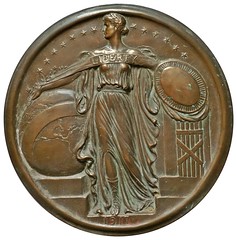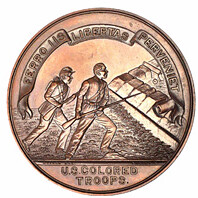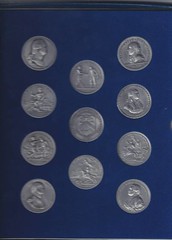
PREV ARTICLE
NEXT ARTICLE
FULL ISSUE
PREV FULL ISSUE
NOTES FROM E-SYLUM READERS: MARCH 12, 2017More on the Liberty Trust Company of Maryland Plaque
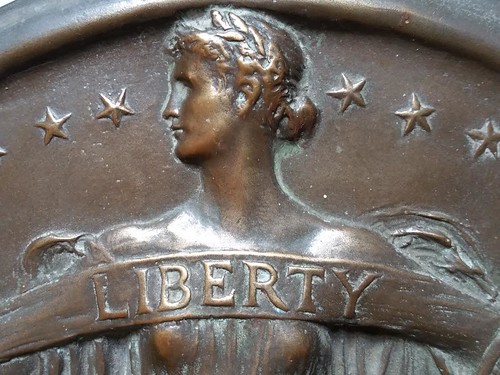 Regarding Alan Stullenbarger's plaque removed from the Liberty Trust Company of Maryland building, Paul Cunningham writes:
If the bank and plaque came into existence some years after 1916, then it is intuitively obvious that the bank decided to generally copy the beautiful Standing Liberty Quarter of the day! I think Paul's on the right track. I think it's clearly a commissioned work, but unusual in that the artist apparently didn't sign it anywhere. And while it's
possible that it represents a rejected Standing Liberty Quarter design, Paul may be right that it was purposely made to resemble that design. -Editor
To read the earlier E-Sylum article, see:
E-Sylum Advertising
Another in a long line of excellent E-Sylum publications. Glad to see the ads, especially from booksellers. They enhance the publication. Thanks for your note. Our advertisers are a great bunch of folks, and we appreciate their support. Be sure to click on their ads and visit their web sites for their latest offerings.
-Editor
The Joseph Brothers in 1852
Lupia is arguing that the Joseph Brothers were not even in business in San Francisco until September/October 1852. This ad appeared in the Sacramento Daily Union, January 19, 1852: 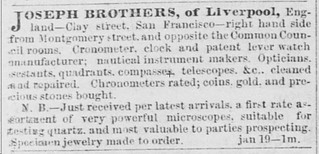 Note too that the Joseph Brothers were buyers of "coins" (this would be silver coins, not collector coins) and "gold" (i.e., gold dust). As you can see, the Joseph Brothers were indeed in business on Clay street in San Francisco as early as January 19, 1852--and had clearly been in business there for some time, since they are advertising a new shipment. They later advertised that they were established in San Francisco in 1850, and one "J. Joseph" disembarked from the S.S. California November 21, 1850 (San Francisco Daily Alta California, Nov. 21, 1850), so this is likely. The Joseph Brothers were well positioned to coin some of the native gold they bought into half dollars in 1852. Thanks! -Editor
To read the earlier E-Sylum articles, see:
More On Arabic Numerals and Dates
John Lupia writes: Arabic numerals could not have been introduced in 787 simply because they did not yet exist. Possibly 200 or 250 years earlier Brahmi numbers also known as Hindu numbers originated that form the basis of what later on evolved into Arabic numerals. The connection between them dates to circa 825 when an Arab scholar known as Al-Khwarizim wrote about this Hindu mathematic system in a treatise translated as “On the Calculation with Hundu Numbers”. Shortly afterwards other Arabic texts continued this study and evolved the Arabic numeral from them making modifications in the glyphs used to represent quantities. This became assimilated in the West at the beginning of the 13th century through business and trade in the Mediterranean with Pisan and Venetian businessmen traveling along the Mediterranean rim on the African continent that was Arab populated. One of the sons of these Italians merchants was educated there travelling with his father known as Leonard Pisano Fibonacci, who was a mathematician and inventor of Fibonacci numbers. As for any coin bearing the date A.D. 515 that is simply absurd. Dionysius Exiguus, a monk, circa 525/7 calculated the birth of Christ to A.U.C. 753 on the Roman calendar. Many credit the use of Exiguus’ calculations to the Venerable Bede, an English historian writing in the late 7th and early 8th centuries. Consequently, it is from the 8th century on we begin to find the Exiguus system used. This is where, in the West, we receive the date today since it was adopted in the Gregorian calendar in 1582. Thanks! Interesting history, and good to keep in mind when looking at early dated coinage. -Editor
To read the earlier E-Sylum article, see:
More On The Butler Colored Troops Medals
Ah, correct! I missed that note at the bottom of the article - I was going by the larger NN logo at the top. Thanks. -Editor
Tony Terranova writes: The article states "the silver ones with few exceptions had the recipient's name engraved on the edge". The "named" ones were done by the recipients themselves, not "issued" in that form. Sometimes, the way the written word gets structured, the wrong information gets put forth. Indeed. Thanks. -Editor
To read the earlier E-Sylum article, see:
More On 'America's First Medals'
I missed your question about the "America's First Medals" set, but saw the responses. I still have my set that I assembled by ordering from the mint at the time. The set was originally advertised as having the Libertas medal in it, but the mint ran into reproduction rights conflict with the Paris mint. I suspect the holders had already been designed and produced, so the Treasury medal was needed to fill the hole. I know it is not valuable, but it is still a neat set and has survived on my bookshelf all these years. That makes sense, and explains a lot. Thanks! -Editor
To read the earlier E-Sylum article, see:
NCIS: Los Angeles Finds a 1933 Double Eagle
I was pleasantly surprised the other night watching NCIS: Los Angeles. The plot was about criminals trying to steal a 1933 Double Eagle. They actually got the information about the coin somewhat accurate even given artistic license. Their plot was about a Secret Service agent searching for one of the “other” 1933s than the one sold at auction – which they discussed to a general degree - over a decade ago in NY. They “found’ it by learning it was buried with a descendent of one of the people who bought it years ago. It wasn’t a great plot but the numismatic aspect kept me watching until the conclusion. It's good to hear the show got some things right. Thanks! Last week's episode was called "Old Tricks". While there are a lot of commercials to sit through (just
like "real" TV, you can watch the episode free online. -Editor
For more information, see:
The BEP Hydrostatic Press Room
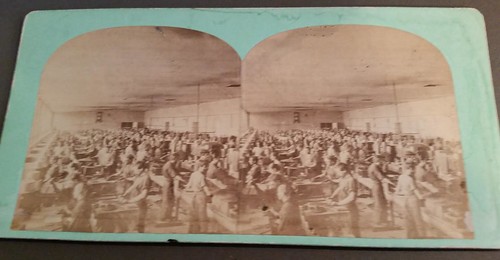 Joe Esposito writes: I picked up this stereoview at an early photograph show in Arlington today. It’s showing the making of currency in the Hydrostatic Press Room at the Bureau of Engraving and Printing. An identical image, with a yellow rather than this blue-green border, is part of the New York Public Library’s digitized collection and is dated 1866. I thought readers might be interested in it. Cool. What a big crowd of workers! I don't believe I've ever seen this view before. Thanks! -Editor
Query: Who Are JHU and GDH?
Maybe readers can help me discover the identities of two numismatists who are identified only by initials. One appears in the William Anton ad in the Feb. '05 issue of The Numismatist. Item #20 of that ad offers the unique brass Castorland for the bargain price, in today's market, of a mere $245,00.00. The coin is said to be "Ex JHU." Persons better informed than myself might recognize JHU. And in the 1867 vol. 2, No. 6, October issue of the American Journal of Numismatics there is an article titled "The Castorland 'Half Dollar' a Misnomer". The article is signed G. D. H. Any help identifying JHU and GDH would be sincerely appreciated. Well, "JHU" seems likely to be Johns Hopkins University, aka the Garrett collection. Can anyone confirm that connection? And what about G. D. H.? I poked through the Newman
Numismatic Portal People section and didn't notice any candidates, and didn't have time to search elsewhere. Who could it be? -Editor
Help Wanted: Antarctic Post Office
In the only-crazy-people-need-apply department is this non-numismatic item from the Daily Mail passed along by Dick Hanscom of Alaska. -Editor
But that hasn’t stopped 265 people applying to run the world’s most southerly post office – at Port Lockroy, in the British Antarctic Territory. The outpost, which has a colony of 2,000 penguins, is visited by 18,000 cruise-ship passengers between November and March. Staff, who hand-frank 80,000 letters, are warned they may have to go two weeks without a shower. Well, if the only way to get there and back is to travel on a cruise ship, that's one way to earn a few free trips. Maybe there's a method to these people's madness.
-Editor
Dick adds: Wait a minute. What do you mean, crazy? A free, all expense paid trip to Antarctica - where do I sign up? But I do live in Alaska, where we had a couple spells of -30F this year (no where near the records), and more snow than in the last 20 years. When we built our house 40 years ago, we lived in the basement with no indoor plumbing and showered at the gym at the university (ok, every day, not every two weeks). We live at the end of a 1/2 mile road with the driveway from hell (there are days I have to put chains on my 4-wheel drive F-250 pickup to get up the driveway), I haul water (400 gallons at a time) and empty it into a 1000 gallon underground tank (yes, I am surprised it does not freeze), and we burn coal to heat the main part of the house (an oil furnace is our backup, heating the basement). My wife wants to move into town, and I just cannot conceive of it. So, does that qualify me as crazy? How about "hardy"? -Editor
To read the complete article, see:
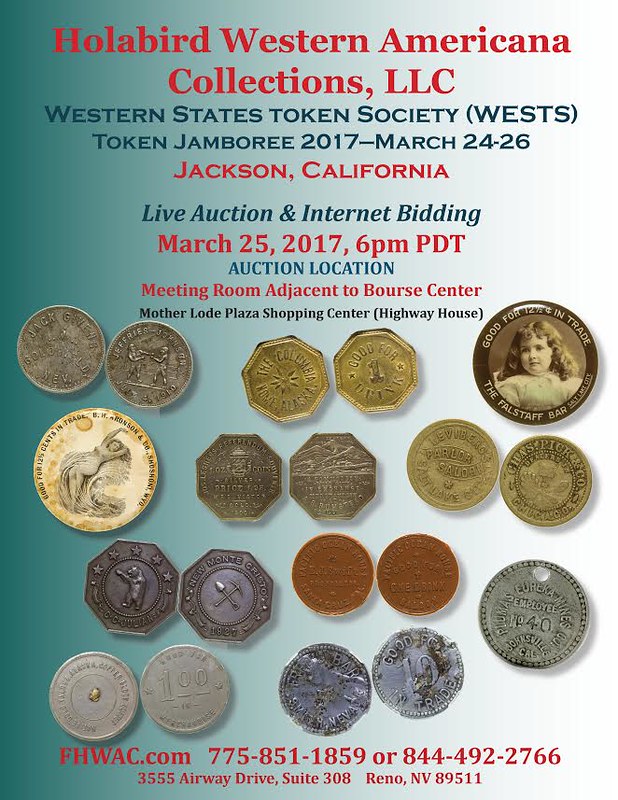 Wayne Homren, Editor The Numismatic Bibliomania Society is a non-profit organization promoting numismatic literature. See our web site at coinbooks.org. To submit items for publication in The E-Sylum, write to the Editor at this address: whomren@gmail.com To subscribe go to: https://my.binhost.com/lists/listinfo/esylum All Rights Reserved. NBS Home Page Contact the NBS webmaster 
|
